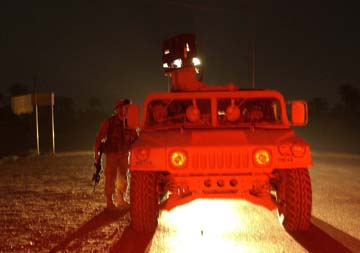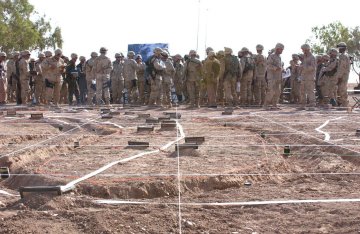
Weapons seized, four soldiers hurt during Operation Peninsula Strike
 |
| Soldiers patrol the streets of Ad Duluiyah, Iraq,
during Operation Peninsula Strike (Click on the graph to view a higher resolution photo) |
AD DULUIYAH, Iraq (Army News Service June 16, 2003) -- The
4th Infantry Division and supporting units from Task Force Ironhorse concluded
an extensive raid on June 12 as part of Operation Peninsula Strike, involving
thousands of soldiers.
The operation led to the capture of approximately 400 detainees and the
seizure of numerous weapons systems and ammunition. Detainees were screened and
questioned, with approximately 60 detainees being released. In addition to
capturing the five people from the U.S. government's most wanted list, several
other high-standing party members were also detained.
The operation took place in two major stages. The first stage involved moving
soldiers and equipment into strike positions, intelligence gathering, and
coordination with local police. Along with the 3rd Bde, 4th ID, units from the,
the 173rd Airborne Brigade, and 3rd Infantry Division's 3rd Squadron, 7th
Cavalry Regiment were involved.
During the second stage, soldiers conducted coordinated raids within the
target area via land, air and water to capture or destroy terrorist elements.
Air assault teams, ground attack forces, raid teams, river patrol boats and
local security combined forces to block off escape routes and operate check
points and systematically sweep the areas suspected of housing terrorists.
In the early morning hours, coalition forces converged on the city of Ad
Duluiyah with the goal of arresting five people on the top 55 most wanted list
of former Ba'ath party members and of removing any paramilitary personnel in the
area.
Two former Iraqi generals surrendered to military forces during the raids.
Maj. Gen. Abul Ali Jasmin, Secretary of Defense Ministry and Brig. Gen. Abdullah
Ali Jasmin, Head of the Iraqi Military Academy, are now being detained and
questioned.
During the operation, the 1st Battalion, 8th Infantry Regiment, worked with
the 720th Military Police Battalion scouring the streets and looking for people
attempting to escape by vehicle. Infantrymen, MPs, and combat engineers
conducted house searches in targeted areas.
Members of the 57th Aviation and 159th Aviation Battalions provided air
support.
"This is an area where a lot of violence against U.S. troops is originating
from," said Lt. Col. Philip Battaligia, commander of 1st Bn, 8th Infantry. "What
we wanted to do was [establish] a presence and maintain a [level of] security,
which I think we have done."
During the operation, four soldiers from the 173rd Airborne Brigade were
injured and evacuated out of the area and are listed in stable condition during
the operation. There were no U.S. soldiers killed during the operation. Two
hostile Iraqi civilians were wounded, treated and sent to medical facilities.
Three specialists - Tamer Hassanien, Kobie Johnson and John Oldenburg -- and
Pfc. James Volpe were injured in an apparent ambush while driving between two
traffic control points.
The soldiers from the Scout Platoon, Headquarters and Headquarters Company,
2nd Battalion, 503rd Parachute Infantry Regiment, were injured when their
vehicles were fired on from what later turned out to be a police station, said
1st Sgt. John Bagby, first sergeant of HHC, 2nd Bn, 503rd PIR.
Hassanien, Johnson and Oldenburg received non-life threatening wounds. Volpe
was treated and released back to his unit.
Overall, the soldiers preformed "magnificently" during the search, said
Battaligia, commander of 1st Bn, 8th Infantry. "They seized the objectives they
were assigned and did it extremely well."
The success of Operation Peninsula Strike marks a significant step forward in
the ongoing journey toward a safe, secure and free Iraq, said Battaligia.
(Editor's note: Spc. Derek Dexter is a journalist with the Task Force
Ironhorse public affairs office. The 173rd Airborne Brigade PAO contributed to
this story)
